Key takeaways:
- Indie game development combines creativity with technical skills, allowing personal emotions and experiences to shape unique gaming experiences.
- Programming is essential for turning ideas into interactive gameplay, ensuring smooth operation, and enhancing player engagement.
- Popular programming languages for games include C++, C#, and JavaScript, each serving different purposes and accessibility for developers.
- Utilizing tools like Unity, Godot, and version control systems like Git can significantly streamline the game development process and foster innovation.
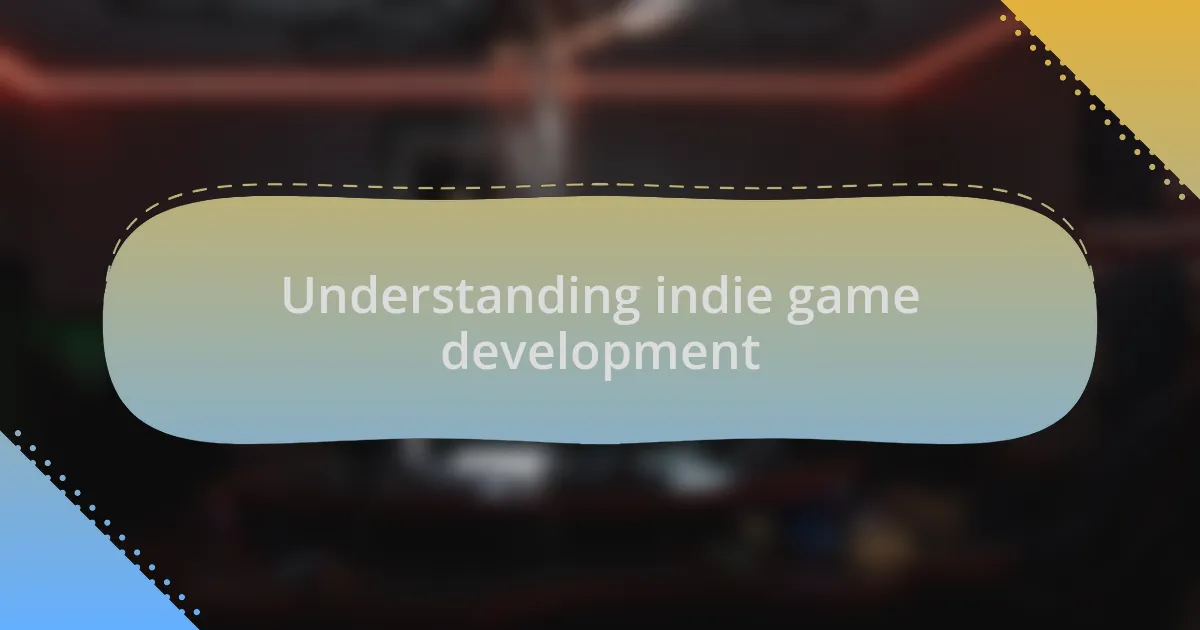
Understanding indie game development
Indie game development is a fascinating blend of creativity and technical skill. I remember the first time I tried creating a game on my own; the excitement and nerves were palpable. It’s not just about coding; it’s about telling a story and building an experience. Have you ever felt that spark of creativity when you thought of a game idea? That’s where it all begins.
One of the remarkable things about this landscape is the sheer diversity of indie games. Each one often reflects the developer’s unique perspective, revealing their personal experiences and emotions. I was once captivated by a simple platformer that conveyed feelings of loneliness and isolation through its art and music. It made me wonder – how can a game evoke such deep emotions with seemingly minimal mechanics?
Understanding indie game development also involves recognizing the challenges that come with it. There’s often a sense of vulnerability when sharing your work with the world. I recall feeling that pang of anxiety before releasing my first game. Will people like it? Will they connect with it? These questions can be daunting, but they also drive innovation and passion, making the indie scene so vibrant and dynamic.
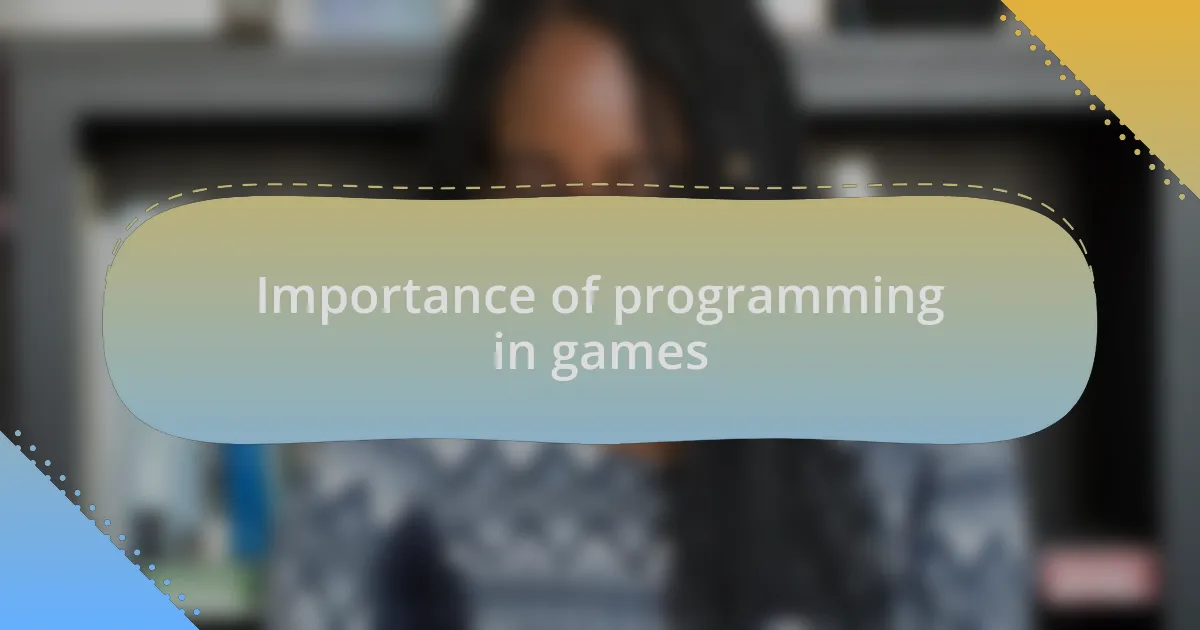
Importance of programming in games
Programming is the backbone of game development, transforming creative ideas into interactive experiences. When I first delved into coding my indie game, I quickly realized that it was more than just lines of text; it was a tool for articulating emotions and experiences. Have you ever wondered how a simple line of code could dictate the behavior of a game character, making it feel alive? That’s the magic of programming.
Without programming, gameplay mechanics would remain a mere concept in our minds. I vividly recall the moment when I successfully coded an enemy AI to react unpredictably. It raised the stakes for players, providing a thrilling challenge that my friends and I loved. That thrill wouldn’t exist without the meticulous work behind the scenes, where programming breathes life into the game.
Moreover, programming is crucial for ensuring the game runs smoothly and efficiently. I often spend hours troubleshooting bugs that, at first glance, seem minor but can disrupt the entire game experience. Have you ever encountered a glitch that pulled you out of the moment? Such hiccups underscore the importance of a solid programming foundation; it’s what keeps the player immersed and engaged in the vibrant world we’ve created.
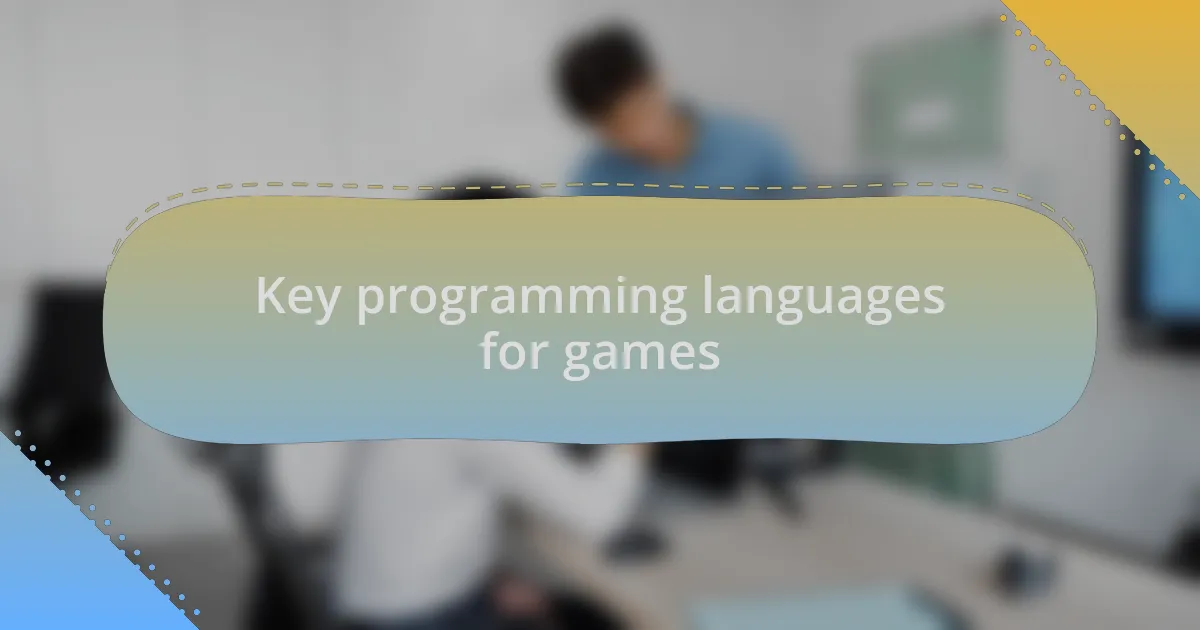
Key programming languages for games
When it comes to programming for games, I have found that languages like C++ and C# are indispensable. C++ is often considered the industry standard, particularly for high-performance games. I remember feeling a rush of excitement when I first tackled memory management in C++, realizing that mastering it would give me control over my game’s efficiency.
Moving on to C#, it has become my go-to language for developing games in Unity. The syntax is cleaner and more approachable, which is especially helpful for newcomers. Have you ever struggled with overwhelming code? I definitely have, and transitioning to C# felt like stepping into a more inviting space where I could experiment without the weight of complex syntax bearing down on me.
Another language worth mentioning is JavaScript, especially if you’re looking to explore web-based games. I dipped my toes into this realm and found that its versatility allows for seamless integration with HTML5. This not only made game development more dynamic but also accessible right out of the browser. It’s such a joy to create games that others can play instantly, don’t you think?
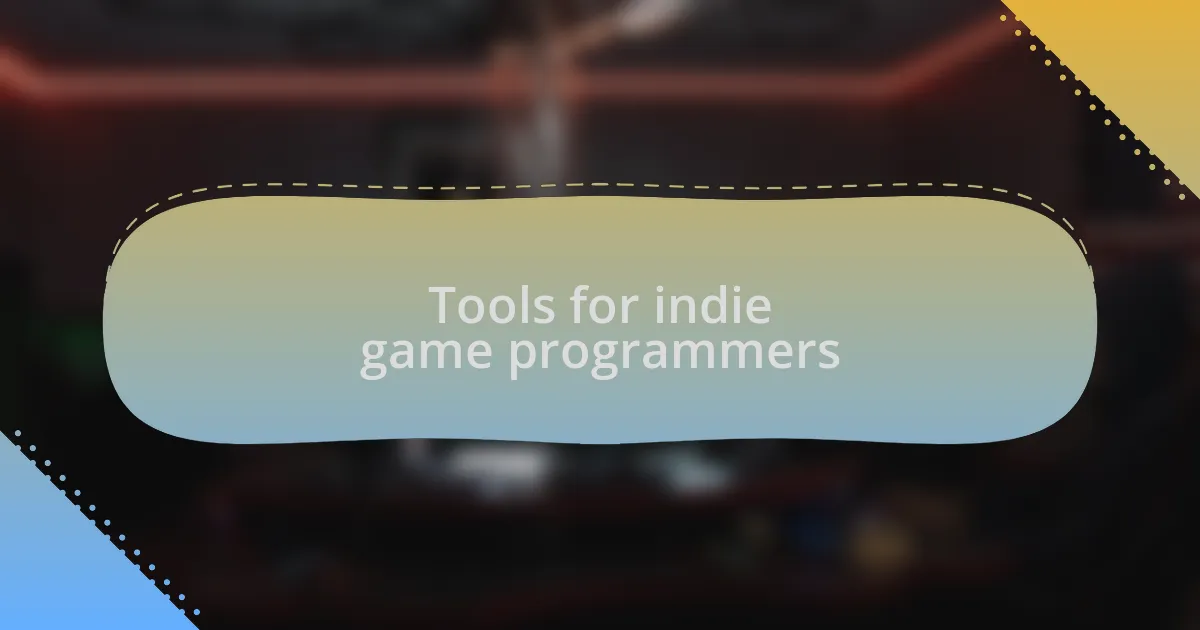
Tools for indie game programmers
When it comes to tools for indie game programmers, I can’t help but rave about Unity. This engine has been a game-changer for me, especially when I develop 2D projects. Remember the first time you experienced a seamless interface? That was my journey with Unity—it made dragging and dropping assets feel like magic while still providing the depth I needed to customize everything down to the tiniest detail.
I also have a soft spot for Godot, a powerful, open-source game engine that’s incredibly programmer-friendly. The ability to use GDScript—similar to Python—felt like a breath of fresh air after wrestling with heavier languages. Have you ever wanted to create something quickly, without getting bogged down by technicalities? I remember whipping up prototypes in Godot that were so fast I could hardly keep up with my ideas, and that rush is something every indie programmer should experience.
Lastly, version control tools, like Git, have become indispensable in my workflow. At first, I underestimated their value, but once I embraced them, it felt like having a safety net. Have you ever dreaded losing hours of work? I certainly have, and implementing Git not only salvaged my projects but also allowed me to experiment fearlessly, knowing I could always revert to a previous state. It’s like having a time machine for your code!
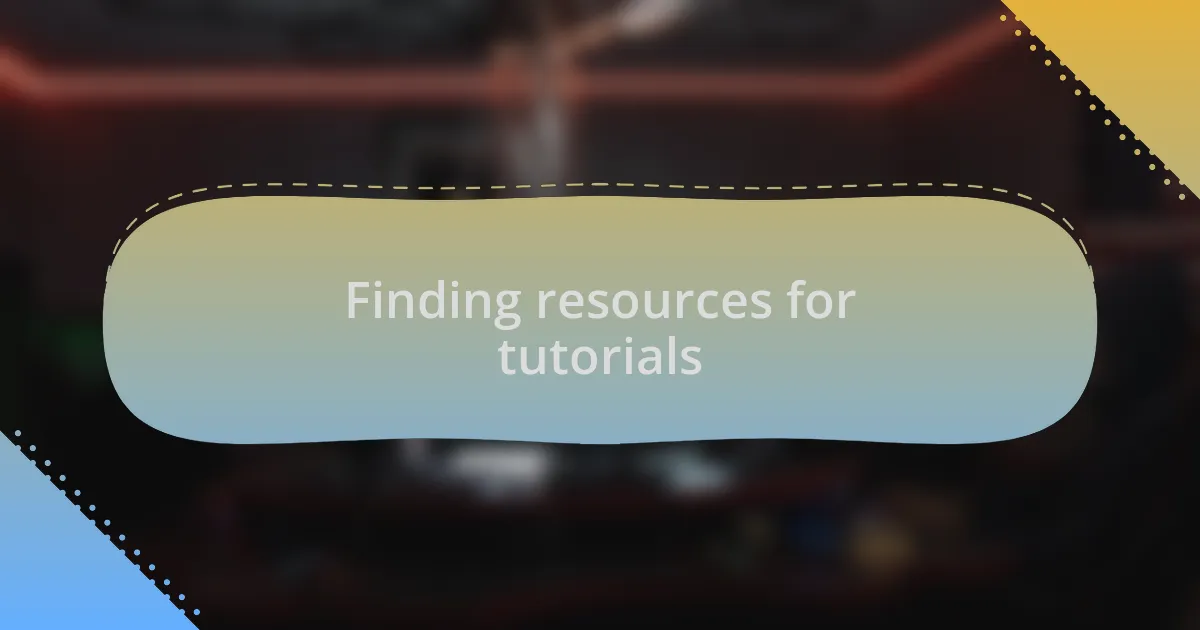
Finding resources for tutorials
Finding high-quality resources for tutorials can feel like searching for hidden treasures in the indie game landscape. I often find myself browsing platforms like YouTube and itch.io, where creators share their insights and experiences. There’s something exhilarating about stumbling upon a tutorial that resonates so well with my learning style; it’s like finding a guide that turns confusion into clarity.
One of my go-to sources is online forums and communities like Reddit and Discord. Engaging in discussions with fellow programmers not only exposes me to diverse perspectives but often leads to discovering excellent tutorial links. I remember a time when a simple question I posted about pixel art led to a wealth of shared resources that transformed my skills overnight—who knew that asking for help could unlock such a treasure trove?
I also can’t stress enough the value of official documentation and online courses from platforms like Coursera or Udemy. They might come with a price tag, but I view these as investments in my future projects. I recall taking an intensive course where I learned about game physics, and the knowledge I gained made an immediate impact on my project—suddenly, my objects weren’t just moving; they had weight and purpose. Have you ever felt that rush when the pieces of a puzzle finally fit together? That’s the power of quality tutorials at your fingertips.
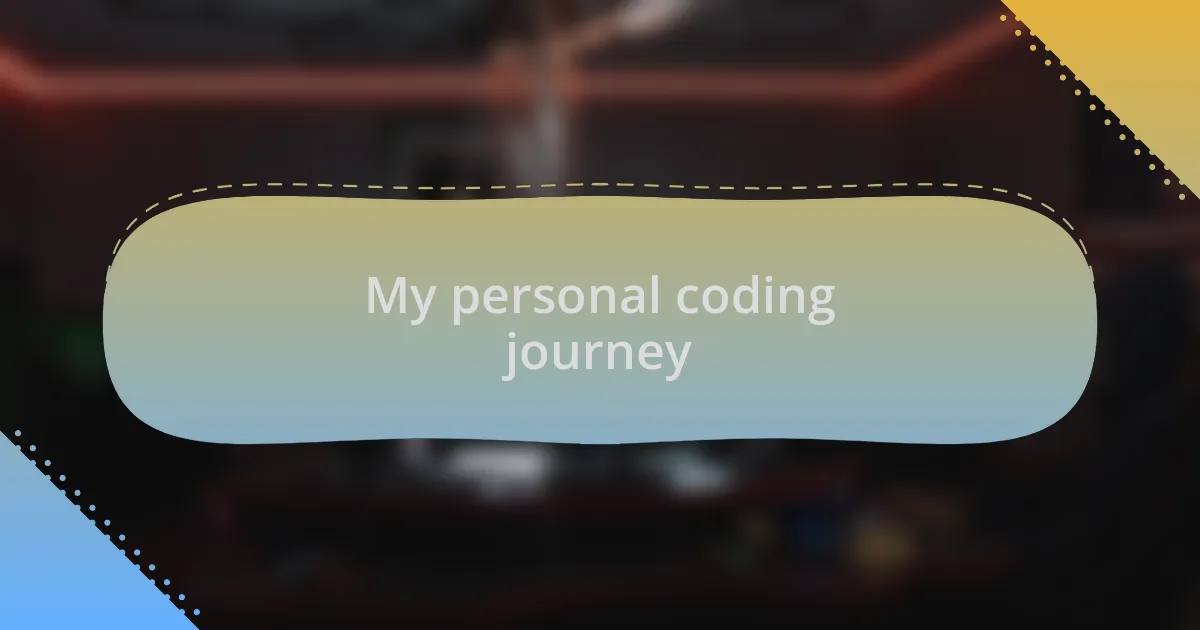
My personal coding journey
My coding journey began as a spark of curiosity, fueled by a love for games. I remember the first line of code I wrote—it felt like casting a spell, unlocking the door to an entirely new world. As I toiled through the syntax, frustrations blended with moments of sheer excitement, especially when my code actually produced something tangible, like a simple character movement. It was during these early trials that I learned the invaluable lesson: persistence is key.
As I progressed, I started experimenting with indie game development tools that bridged my passion and technical skills. One particular weekend, I decided to create a mini-platformer in my spare time. The sense of accomplishment I felt after watching my character jump and collect items was euphoric; it was a reminder of why I started coding in the first place. I often wonder, how many others out there have felt that same rush when they see their first creation spring to life?
Now, I frequently reflect on how much I’ve grown. Each project has taught me not just about coding but also about creativity, problem-solving, and resilience. I recall facing a daunting bug just last month; it was like an unsolvable riddle. After days of searching, the triumph of finally fixing it was immensely rewarding. Can you remember your own moments of breakthrough, where perseverance met success? That’s where the magic lies in our coding journeys.